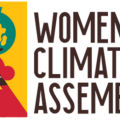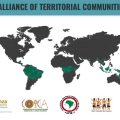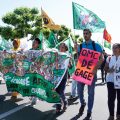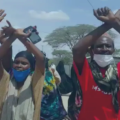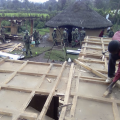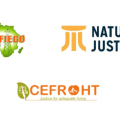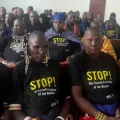Year after year, one UN Climate Conference of the Parties (COP) after another, the global climate crisis only worsens. Caused in great part by agribusiness and the destructive capitalist system it fuels, today’s crisis is a direct result of an economic system that exploits every form of life without recognizing any limits to nature. Mother Earth’s intricate systems and life-sustaining cycles are broken, with the devastating Covid19 pandemic, and the inaccessibility of health care for many, demonstrating just how cruel capitalism can be when it comes to inflicting the pain, suffering and loss, caused by the destruction of nature. Be it in Pakistan, Palestine or Puerto Rico – to name just a few – the once distant threat of “climate change” now comes in wave after wave of “catastrophic weather events” making climate-fueled tragedies an all-too-frequent part of people’s daily lives. From droughts to floods, through wildfires and hurricanes, these extreme manifestations have threatened and even destroyed people’s lives and food sovereignty, who are calling for real solutions to limit global warming to 1.5°C. As if that weren’t enough, wars, occupations and sanctions are dished out by the power-hungry with little regard for the UN-recognized rights to Food, Health, Peace and Self-Determination, much less the now universal human right to a “clean, healthy and sustainable environment” (UN General Assembly, 2022). In addition, The State of Food Security and Nutrition in the World (SOFI, 2022) reported that the climate vulnerable and extremes underline rising numbers of hungry people, poverty and inequality.
At the UN Framework Convention on Climate Change (UNFCCC) and its annual Climate COPs, transnational corporations (TNCs) use their control over most national governments and multilateral institutions to commodify the crisis, deny fossil fuel capitalism has anything to do with it, and limit any real possibility of transformative change. Though the corporate food system is responsible for more than 50% of all greenhouse gasses (GHGs), the Bayer-Monsanto’s of the world offer nothing more than profit-hungry proposals packaged into shameful “net zero” schemes. Instead of a very real, urgent and necessary reduction in emissions – whose main responsibility lies with the elites of historic emitters such as the United States, Europe, Canada and Australia – corporate false solutions provide a free pass to the dominant colonial core while leading a global assault on rural communities, livelihoods and territories. So-called “nature-based solutions” (NBS) such as REDD and REDD+, “soil carbon for offsetting” and other market-based trading schemes, and the corporate takeover of agriculture through patenting, “digitalization”, “sustainable intensification” and “climate-smart(ation)” are all big wins for agribusiness but terrible losses for peasants, indigenous peoples, fisherfolk, forest dwellers and others on the frontlines of the global climate crisis. And when the great hoax of “net zero” fails to calm the climate, transnational corporations promise extremely high-risk geoengineering will somehow save the day (or at least their profit margins). This has been the norm at Climate COP after Climate COP, and the 27th Annual Conference of the Parties (COP27) is unlikely to be any different.
Supposedly “Africa’s COP”, this year’s Climate COP is set to take place at the elitist and artificial enclave that is Egypt’s Sharm el Sheikh. Far removed from the African and Arab People’s steadfast struggles for self-determination, COP27 is leaving very little room for organized communities to speak truth to corporate power. For this reason, among others, many of our sister organizations of the Africa Climate Justice Collective (ACJC) organized the African People’s Counter COP demanding real solutions rooted in climate justice, a prioritization of people and the planet, and an end to corporate control of the UNFCCC. These demands are in line with our hard-fought UN Declaration on the Rights of Peasants and Other People Working in Rural Areas (UNDROP):“States shall take all necessary measures to ensure that non-State actors that they are in a position to regulate, such as private individuals and organizations, and transnational corporations and other business enterprises, respect and strengthen the rights of peasants and other people working in rural areas..(and)…take appropriate measures to ensure that peasants and other people working in rural areas enjoy, without discrimination, a safe, clean and healthy environment”.
It is precisely because of this context that La Vía Campesina will be at COP27. Delegates from member organizations will make their voices, traditions, experiences and solutions heard. We will continue to promote, practice and uplift Food Sovereignty as the right of peoples to healthy and culturally appropriate food produced through ecologically sound and sustainable methods and the right to define our food and agricultural systems. We will explain once again that peasants through agroecological practices and territories cultivate more than 70% of the food produced worldwide on less than 30% of the arable lands available. We will emphasize that Agroecology is a sustainable path forward based on centuries of experience and accumulated real evidence – it is a science, a social movement and a lifestyle practised by millions around the world through meaningful work, cooperation, strategy and organization. We will amplify and share UNDROP, an international legal instrument that we helped to create and that defends people’s rights over their territories, seeds, waters, forests and that promotes a more sustainable way of being and living. We will stand in Solidarity with all who struggle for collective rights and reiterate the need for “common but differentiated responsibilities” among States – including a vibrant Green Climate Fund free of any International Monetary Fund (IMF) or World Bank (WB) influence, void of all neo-liberal impositions that serve only to further exploit people and the planet, and fully financed through climate reparations for the colonial legacies of the past and present. We stand in solidarity with and support those in the Climate Justice Movement demanding climate just reparations, not simple “climate finance”. Finally, we will be in COP27 continuing to expand our arms and shoulders building solidarity, action and common strategy with grassroots organizations, alliances and social movements from around the world fighting for climate and social justice.
While most national governments and multilateral institutions offer capitalist solutions that systematically fail to address the climate crisis, we, the organized voice of over 200 million peasants, landless workers, indigenous people, pastoralists, fishers, migrant, farmworkers, small and medium-size farmers, rural women, peasant youth and gender-diverse persons of La Via Campesina, in convergence with a diversity of movements for Climate Justice, reiterate here and now our real solutions: FOOD SOVEREIGNTY COOLS THE PLANET ! We will build it with agroecology and peasants’ rights to ensure a Just Transition rooted in people’s power, ecological and social well being, and solidarity at the local, regional and international context. Together, in struggle, we will win!
Original Source: La Via Campesina
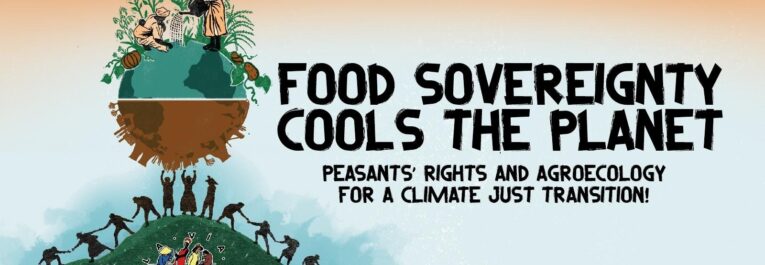

 MEDIA FOR CHANGE NETWORK1 week ago
MEDIA FOR CHANGE NETWORK1 week ago
 MEDIA FOR CHANGE NETWORK2 weeks ago
MEDIA FOR CHANGE NETWORK2 weeks ago
 FARM NEWS1 week ago
FARM NEWS1 week ago
 MEDIA FOR CHANGE NETWORK4 days ago
MEDIA FOR CHANGE NETWORK4 days ago
 MEDIA FOR CHANGE NETWORK4 days ago
MEDIA FOR CHANGE NETWORK4 days ago
 MEDIA FOR CHANGE NETWORK1 day ago
MEDIA FOR CHANGE NETWORK1 day ago
